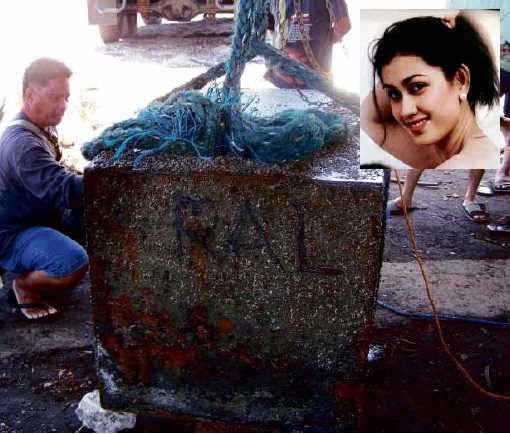
Justice remains elusive for the family of Ruby Rose Barrameda (inset) more than four years after her body was found in the waters off Navotas City, encased in cement inside a drum that had been placed inside a steel box. She was battling her husband, Manuel Jimenez III, for custody of their two daughters when she disappeared in 2007. Manuel Montero, who had admitted his participation in the killing, linked Jimenez to her death although he later retracted his testimony. INQUIRER PHOTOS
As far as the Court of Appeals is concerned, the Ruby Rose Barrameda case will be raffled off to a new judge while Manuel Montero—one of the accused—can turn state witness despite the fact that he has recanted his previous statements.
In an eight-page resolution promulgated on Sept. 19, the court’s Special Former 10th Division of Five denied two separate motions for reconsideration filed by another one of the accused, Manuel Jimenez Jr., and the Office of the Solicitor General (OSG).
In March, Jimenez asked the appellate court to reconsider its Feb. 18 ruling, which upheld a lower court’s decision to discharge Montero as a state witness. At the same time, he sought the inhibition of one of the justices, Associate Justice Jose Reyes, from the case.
The resolution, a copy of which was obtained by the Inquirer, was signed by Reyes himself and concurred in by Associate Justices Celia Librea-Leagogo, Priscilla J. Baltazar-Padilla, Agnes Reyes-Carpio and Melchor Quirino Sadang.
In junking the motion to inhibit filed against Reyes, the appellate court called as “utterly baseless” Jimenez’s “insinuations” that the associate justice had changed his mind on the matter (the discharge of Montero as a witness) to please President Aquino who had nominated him to the Supreme Court.
Complete turnaround
The justices’ stand in the Feb. 18 ruling was a complete turnaround from their previous decision on May 22, 2012, in which they denied the state’s motion to allow Montero, who had admitted his participation in the killing of Barrameda and tagged Jimenez and the victim’s husband, Manuel Jimenez III, as the masterminds, to turn state witness.
The court, however, told Jimenez that the amended decision was “already promulgated” three months after the vacancy in the Supreme Court was filled up with the appointment of Associate Justice Marvic Leonen.
It also noted that this was “not the first time” Jimenez, Barrameda’s father-in-law, had sought Reyes’ inhibition after a ruling was made that was “not to his liking.”
“Petitioner should not try the patience of the courts by imputing malice and ill will on Judges and Justices based on half-truths and unfounded claims,” the resolution penned by Reyes himself said.
The court added that it was offended by the language used by Jimenez’s counsel in the motion for reconsideration as it ordered him to “abstain from [using] offensive or menacing language” before the court.
The lawyer was further told to “refrain from attributing to a judge motives that [were] not supported by the record or [had] no materiality to the case.”
“The counsel, despite the use of the phrase ‘with all due respect,’ conveys exactly the opposite when he stated that he cannot help but ‘roll his eyes’ [at] the Ponente’s Reflections…,” it said.
At the same time, the court also junked Jimenez’s motion that it reconsider its earlier decision to allow Montero to turn state witness.
It stressed that although Montero recently retracted his statements linking Jimenez and several other accused to the killing of Barrameda, this did not change its findings that Malabon Judge Zaldy Docena did not act with “grave abuse of discretion” when he ruled that Montero could testify for the state.
Docena, of the Malabon Regional Trial Court Branch 170, was in charge of trying the murder case until the Court of Appeals ordered it reraffled to another judge.
As for the motion for reconsideration filed by the OSG on the transfer of the case to a new judge, the court said that “no new or cogent reason [had] been proffered that would justify the reversal of our ruling.”